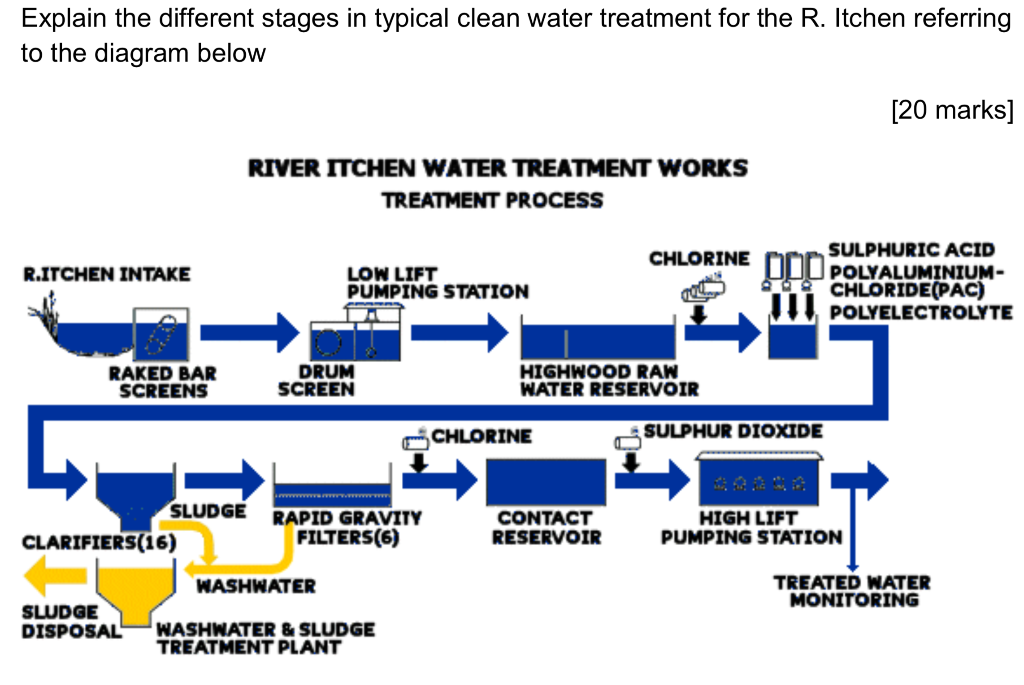See This Report on House Water Treatment
Table of ContentsThe Ultimate Guide To House Water TreatmentExamine This Report about House Water TreatmentThe Best Strategy To Use For House Water TreatmentLittle Known Questions About House Water Treatment.Everything about House Water TreatmentRumored Buzz on House Water Treatment
A phosphorous compound is contributed to help manage deterioration of pipelines. This aids stop lead and copper that may be present in pipelines from seeping into the water. As the water leaves the plant, ammonia is added to change the chlorine to chloramine, a disinfectant that keeps a recurring in the distribution system against microbial contamination.All chemicals that are added are certified food quality, secure for usage in foods. Treated water is stored in deep below ground storage tanks and also streams by gravity to pumping terminals and also into the distribution system. The circulation system consists of 1,960 miles of water pipe varying in diameter from 4" to 60".
Elimination of preference and also smell substances from the water.: Softens the water.: Filtering to get rid of tiny bits and also sanitation to eliminate viruses as well as microorganisms, and also ensure an unsuitable atmosphere for virus and also microorganisms development throughout the distribution system.
The Definitive Guide to House Water Treatment

According to the EPA, The Tidy Water Act (CWA) establishes the standard framework for regulating discharges of toxins into the waters of the United States and also managing quality requirements for surface waters. Under the CWA, EPA establishes wastewater requirements for sector. The EPA has actually also established national water top quality requirements recommendations for toxins in surface area waters.
Related White Documents Select Products Phase Two Testing Removal of grit by moving the influent over/through a grit chamber. Great grit that locates its means right into the influent demands to be gotten rid of to prevent the damages of pumps and also tools downstream (or impact water flow). As well small to be screened out, this grit needs to be gotten rid of from the grit chamber.
The 3-Minute Rule for House Water Treatment
Phase 4 Oygenation Air is pumped into the oygenation tank/basin to urge conversion of NH3 to NO3 and also offer oxygen for microorganisms to continue to proliferate and expand. As soon as converted to NO3, the bacteria remove/strip oxygen particles from the nitrate particles and also the nitrogen (N) is offered off as N2 (nitrogen gas) (house water treatment).
This begins in the oygenation container. The key function of the oygenation tank is to pump oxygen right into the storage tank to motivate the malfunction of any kind of organic product (and the growth of the bacteria), in addition to guarantee there is enough time for the organic product to find be damaged down.
This procedure is taken care of to offer the finest problems for bacterial development. Liquified oxygen tracking at this stage of the plant is critical. Ammonia and also nitrate dimensions are common to gauge exactly how effective the microorganisms are in transforming NH3 to N2.
An Unbiased View of House Water Treatment
Stage 5 Second click over here now Clarifier Dealt with wastewater is pumped right into a second clarifier to permit any type of remaining organic debris to resolve out of cured water flow. As the influent leaves the aeration procedure, it moves into an additional clarifier where, like the key clarifier, any extremely little solids (or fines) sink to the bottom of the tank.
Component of this turned on sludge is returned to the aeration storage tank to boost the microbial concentration, assistance in propagation, and also speed up the failure of natural material. The unwanted is thrown out. The water that moves from the secondary clarifier has considerably lowered natural product as well as ought to be approaching anticipated effluent requirements.
With the enhanced concentration of microorganisms as part of the aeration stage, there is a need to evaluate the outbound effluent for microorganisms visibility or absence as well as to decontaminate the water. This makes certain that more than specified focus of microorganisms are not launched right into the environment. Chlorination is one of the most usual as well as inexpensive sort of disinfection yet ozone as well as UV disinfection are likewise raising in popularity.
Little Known Questions About House Water Treatment.

After adequate time, particles comply with each other and grow right into bigger fragments, or, floc, which is prone to work out in water. This process of floc development is called flocculation. To assist in the flocculation of bits, an anionic polymer is included in the mixing zone of news the cone. Information of water is completed by the seperation of put on hold solids from water by gravity.
The clarified water steps upwards gradually, eventually passing over the effluent dam to the cone electrical outlet and on the to filters for further therapy. The water plant integrates a solitary phase lime softening procedure to get rid of hardness. Hardness is brought on by the presence of dissolved bivalent as well as polyvalent metal ions, mainly calcium and also magnesium. house water treatment.
The Facts About House Water Treatment Revealed
This is added both in the clearwell and also the high service discharge as water enters the distribution system. Hydrofluosilicic acid provides the source of fluoride, which is helpful in the avoidance of dental cavity in kids. A fluoride focus of 1. 1-1. 2 mg/l is generally preferable in the plant tap.